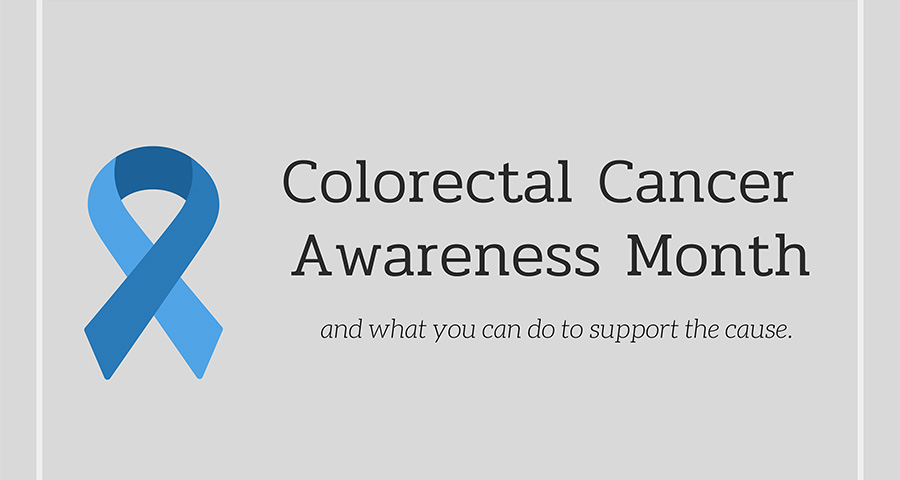
Book a Consultation
Thank you!
Your form has been sent successfully.



March 25, 2021
In an effort to increase public awareness and raise funds for research and treatment, on February 29th 2000 President Bill Clinton established via Presidential Proclamation that The United States would observe National Colorectal Awareness Month annually each March.
This article will focus on providing you with some basic insight into colorectal cancer as well as ways you can affect positive change in the lives of current and future patients, survivors, and their families alike.
One of the most important things you can do this month is to educate yourself about colorectal cancer (CRC) and how it impacts those affected by it. The current campaign statement of National Colorectal Cancer Awareness Month is “Don't Assume”. This statement aims to combat myths and misunderstandings regarding public knowledge of colorectal cancer (for instance, the notion that CRC is hereditary, or that only seniors are afflicted) and encourages physicians to take greater care in screening for CRC.
Colorectal cancer often goes misdiagnosed due to the fact that it shares many symptoms with benign conditions such as diverticulitis and Crohn’s disease.
Colorectal cancer refers to cancers that originate in the colon and rectum. It begins as a small precancerous polyp presenting on varying segments of the lower intestinal lining and grows deep into the muscle tissue before finally spreading to other sites like the lungs and liver.
The American Cancer Society estimates that in 2019, over 44,000 people will be diagnosed with rectal cancer, and over 100,000 will receive a diagnosis confirming colon cancer. The incidence of colorectal cancer is higher in men than in women, likely because of better screening practices in women and the protective effects of female sex hormones.
Despite being both the third most common type of cancer diagnosis as well as the second most fatal - more than 50,000 people are estimated to die from colorectal cancer in 2019.
Colorectal cancer research is moderately underfunded compared to other cancer types.
Although colorectal cancer is very common and very deadly, according to a 2012 analysis of survivorship quality of life measurements, most colorectal cancer survivors live their remaining years in good health so long as a diagnosis is made in the early stages of the disease.
The majority of colorectal cancer diagnoses occur in people over the age of 60. Tragically, in cases where colorectal cancer begins formation at a young age, misdiagnoses are very common. This is mostly due to the lack of proper screening and speaks to a need for greater suspicion by physicians when assessing the colorectal health of young patients.
Like most cancer incidences, colorectal cancer is often preventable through lifestyle changes and regular screenings. Correlative factors include inflammatory bowel disease, having a first-degree relative with CRC, obesity, lack of exercise, tobacco use, and consumption of processed meat.
You can improve your chances of living cancer-free by quitting tobacco now. Tobacco is the leading cause of preventable cancers and It's estimated that over 30% of cancer deaths yearly can be attributed to tobacco use. There are several resources available to help tobacco users discontinue use, such as Quit.com.
It’s difficult to pinpoint exactly how nutrition impacts colorectal cancer risk, but guidelines for prevention focus on reducing direct risk factors like inflammation and indirect risk factors such as obesity. Consumption of foods rich in fibre, vitamin D, and whole grains are associated with lowered risks of colorectal cancer.
Exercise plays a crucial role in keeping your BMI within a healthy range and minimizing body fat. It’s recommended that adults engage in either 2 hours of low-intensity physical activity, or just over an hour of vigorous activity each week.
For more in-depth nutrition and exercise guidelines, visit the American Cancer Society's website.
There are a few ways you can contribute to the battle against colorectal cancer and help raise awareness:


January 07, 2026
A chemo port is a small device placed under your skin that makes recei...
KNOW MORE

December 24, 2025
It's natural to wonder if testosterone replacement therapy (TRT) is sa...
KNOW MORE

December 24, 2025
A rash that will not calm down is scary, especially when it changes or...
KNOW MORE

December 24, 2025
Florida’s lung cancer burden remains significant and affects many fa...
KNOW MORE

December 24, 2025
A partial hysterectomy, also called a supracervical hysterectomy, is s...
KNOW MORE

December 24, 2025
Finding a rash on your breast can be unsettling, but remember, many ra...
KNOW MORE
